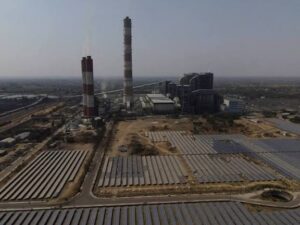In a major move to strengthen and modernize its power sector, the Nigerian government has launched a feasibility study to explore how renewable energy—especially solar and wind—can be added to the national grid using battery storage systems.
The study was announced during a workshop in Abuja and is aimed at addressing Nigeria’s long-standing power challenges, including unstable electricity supply, frequent blackouts, and underuse of generated power. A key part of the project is the use of Battery Energy Storage Systems (BESS), which can store electricity when supply is high and release it when demand rises.
Speaking at the event, Minister of Power, Chief Adebayo Adelabu—represented by Bem Ayangeaor—said the study is more than a technical step; it’s a strategy to prepare Nigeria’s grid for future energy demands. He highlighted how battery storage can help stabilize the grid, reduce reliance on fossil fuels, and support wider use of renewable energy.
“Battery systems don’t just store energy—they help keep the lights on by supporting the grid during disturbances,” Adelabu said. He also pointed out that modern battery storage can act like a power generator, helping to maintain voltage and frequency levels when the grid is stressed.
The Transmission Company of Nigeria (TCN) also backed the move. Executive Director of Transmission Service Provider, Olugbenga Ajiboye, said battery storage can help reduce pressure on the grid, improve efficiency, and ensure smoother delivery of electricity to homes and industries.
The African Development Bank (AfDB), which is supporting the study with a $1.2 million grant, emphasized the importance of energy storage in unlocking the full potential of Africa’s solar resources. Dr. Abdul Kamara, represented by Chigoziri Egeruoh, said while Africa has nearly 60% of the world’s best solar energy, it only accounts for 2% of global energy storage capacity.
“This is no longer about luxury. Battery storage is essential for stable and reliable power,” Kamara noted.
Nigeria is also part of the AfDB’s $20 billion Desert to Power Initiative, which aims to provide 10,000 MW of solar energy across the Sahel region and power 250 million people.
Meanwhile, Nigeria’s power sector is targeting big improvements. The Executive Director of the Nigerian Independent System Operator, Shehu Aliyu, said the country is working to grow its generation capacity to 15,000 MW and transmission to 10,000 MW by 2026, up from a current capacity of 8,500 MW.
With more than 90 million Nigerians still without reliable electricity, the new study is seen as a vital step toward providing cleaner, more stable, and more inclusive power for all.









